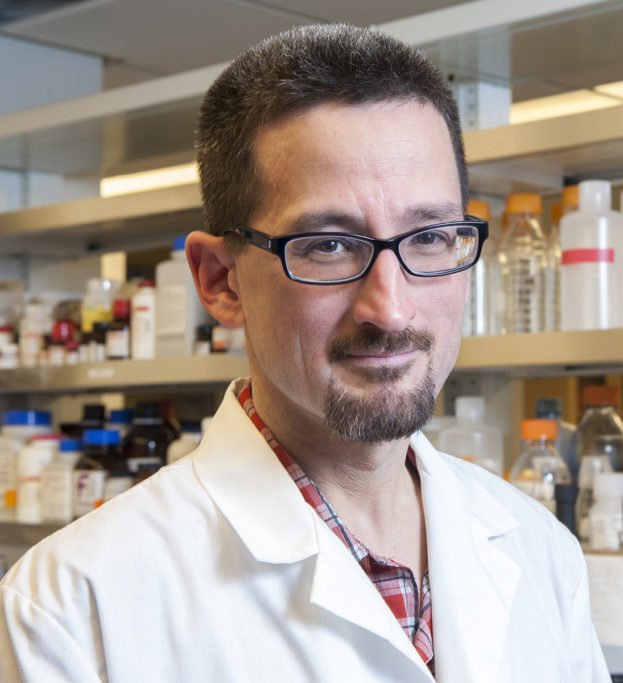Announcing the 2022-2024 Pilot Grant Awardees
Investigation of PASC in Immunosuppressed Patients

PI: David Perkins, MD, PhD, Professor, Department of Medicine, UIC College of Medicine
Co-Investigators: Richard Novak, MD, Professor, Department of Medicine, College of Medicine; Zahraa Hajjiri, MD, Assistant Professor, Department of Medicine, College of Medicine; and Yang Chen, Graduate Teaching Assistant, Department of Biological Sciences, College of Liberal Arts & Sciences
Summary:
For those suffering from kidney disease, a kidney transplant offers the best opportunity for improved survival and quality of life. However, due to the immunosuppressive drugs necessary to maintain the transplant, there is a greater risk of infection. COVID-19 infection may impact those who are immunosuppressed, and it is essential to determine the immune pathways involved not only in COVID-19 infection, but in long term effects of COVID-19, termed post-acute sequelae of COVID-10 (PASC) or “long COVID”. PASC impacts an estimated 10% of all COVID-19 patients. However, its precise mechanism, diagnostic criteria, and treatment options remain poorly understood. In this pilot project, we will use tools our grouphas developed and implemented to study PASC. Our focus will be on a cohort of immunosuppressed kidney transplant patients with a history of COVID-19. We postulate that immunosuppression will promote enhanced susceptibility to PASC.
Role of CCL28/CCR10/eNOS Signaling in Diabetic Foot Ulcers

PI: Timothy Koh, PhD, Professor, Department of Kinesiology and Nutrition, UIC College of Applied Health Sciences
Co-Investigators: Richard Minshall, PhD, Professor, Department of Anesthesiology, College of Medicine and Zhenlong Chen, PhD, Research Assistant Professor, Department of Anesthesiology, College of Medicine, Stephanie Wu, DPM, MS, FACFAS, Professor of Surgery, Scholl College of Podiatric Medicine, Rosalind Franklin University
Summary:
Chronic, non-healing diabetic foot ulcers are common in patients with type 2 diabetes, and often result in limb amputation and death, with disproportionate impact on low income populations and communities of color. The prevalence of diabetes and the rate of amputations and amputation-related mortality is higher in African American, Hispanic and Native American populations than in the non-Hispanic white population. Many factors contribute to the development of diabetic foot ulcers, including chronic inflammation and impaired blood supply. In fact, poor blood supply to diabetic foot ulcers increases risk of amputation by 5-10 fold. Our mouse studies demonstrate an important role for the inflammatory molecule CCL28 and its receptor CCR10 in regulating inflammation and new blood vessel formation in skin wounds. Our studies also show that excessive activity of this CCL28/CCR10 pathway contributes to poor blood vessel formation in the wound and impaired healing in diabetic mice. Therefore, we propose to translate our mouse findings to human studies and test the hypothesis that increased activity of the CCL28/CCR10 pathway in wounds of diabetic patients is associated with a defect in new blood vessel formation, poor blood supply, and impaired wound healing. The proposed pilot study will generate important preliminary data for an R01 application focused on the CCL28/CCR10 pathway as a potential novel therapeutic target to improve healing of diabetic foot ulcers and prevent amputations and death.
Pilot Testing of a Structural Racism Intervention for Latinx Immigrant Families: Blending of Implementation Science and Community-Engaged Research

PI: Stephanie Torres, PhD, Bridge to Faculty Postdoctoral Research Associate, Department of Education Psychology, UIC College of Education
Co-Investigators: Yamile Molina, PhD, Assistant Professor, Department of Community Health Sciences, School of Public Health; Geri Donenberg, PhD, Professor and Director Center for Implementation Science and Healthy Youths Program, College of Medicine
Summary:
Overall goal. Structural racism, including immigration fears, discrimination, and linguistic isolation, drives disproportionate stress among Latinx immigrant families. This proposal builds off ongoing work with a community-based organization, The Resurrection Project (TRP), in Chicago and seeks to pilot and evaluate an innovative, multilevel intervention focused onreducing stress due to structural racism among Latinx immigrant parents and youth. To our knowledge, this will be the first community-based intervention that seeks to reduce stress and promote resilience in the context of structural racism within Latinx immigrant families using a multitiered intervention framework. This study will set the stage for a fully powered, randomized control trial (RCT), with the potential to expand this intervention across multiple sites.Public health relevance. Individual factors alone cannot account for continued disparities among Latinx immigrant communities and there is a critical need to consider structural factors as key determinants of health. Findings will inform innovative ways to address stress stemming from structural racism by integrating efforts across individual, interpersonal, community, and societal levels while highlighting the importance of integrating community expertise and building community capacity.
Improving the Health and Social Participation of People with Disabilities from Underrepresented Groups post COVID and in Public Health Emergencies

PI: Joy Hammel, PhD, Professor, Department of Occupational Therapy, UIC College of Applied Health Sciences
Co-Investigators: Jessica Kersey, PhD, Postdoctoral Research Associate, Department of Occupational Therapy, College of Applied Health Science; Emily Kringle, PhD, Visiting Research Assistant Professor, Department of Occupational Therapy, College of Applied Health Science
Summary:
The COVID-19 pandemic has disproportionately affected the health and societal participation of people with disabilities, yet little research has been done to document and act upon these disparities, especially with people with disabilities from underrepresented groups, including African American/Black, Latinx, and people living in poverty. Disability rights communities have identified these individuals are at high risk for COVID, additional long term disabilities following it, and unwanted nursing home placements. They also are experiencing social isolation that can further affect long term physical and mental health. Yet there are no evidence-based interventions available to address this isolation, build social networks of support, and strategize health and return to social participation since COVID. In this pilot project, we will collaborate with these communities in community-based participatory research (CBPR) to document the long term impact of COVID on people with disabilities from underrepresented groups, including analysis of the national Census PULSE Survey of COVID impact, and participatory focus groups and community asset mapping with diverse disability community members to document lived experiences, issues and unmet needs. Findings will be shared in community Town Halls and used to collaboratively design a community-based intervention to address social isolation and increase health and social participation. We will pilot test this intervention with people with disabilities from underrepresented groups. We will also collaborate with communities to take actions to improve public health and community services, supports and resources to address documented disparities and unmet needs experienced by diverse people with disabilities.
Broadly effective ACE2 decoy receptor engineered to bind wild type and SARS CoV-2 spike (S) protein variants of concern (VOC)

PI: Mohammad Islam, PhD, Research Assistant Professor, Department of Chemistry, College of Liberal Arts & Sciences
Summary:
The severe acute respiratory syndrome coronavirus 2 (SARS-CoV-2) responsible for coronavirus disease 2019 (COVID-19) is still causing major global health and economic implications. While vaccines continue to advance in clinical trials and three vaccines have been approved by the FDA for emergency use authorization or full approval in the United States, there is still an unmet need to deliver therapeutic options to those infected, especially in hospitalized patients. SARS-CoV-2 variants of concern continue to arise, decreasing vaccine efficacy, and decreasing efficacy of emergency use antibody therapies. Our goal is to computationally design and experimentally test a number of SARS-CoV-2 protein-based and small molecule therapies that are resistant to current and developing variants of concern and that also display pancoronavirus activity to help combat future coronavirus strains. We will engineer soluble ACE2 (sACE2) decoy receptor against the receptor-binding-domain (RBD) of wildtype and variants of concern of SARS-CoV-2. In addition to soluble ACE2 decoy receptors, peptide viral fusion inhibitors and Mpro inhibitors may serve as promising “cocktail” therapeutics against most of the variants of SARS-CoV-2 and can potentially be used as a pancoronvirus therapy for the emergence of future coronavirus strains.
Motivating Medication for Opioid Use Disorder (MOUD) - Implementing Contingency Management in MOUD

PI: Margaret Wardle, PhD, Assistant Professor, Department of Psychology, College of Liberal Arts & Sciences
Co-Investigators: Brittany Rudd, PhD, Assistant Professor, Department of Psychiatry, College of Medicine; Nicole Gastala, MD, Clinical Physician and Assistant Professor, Department of Family Medicine, Mile Square Health Center, UI Health
Summary:
Opioid addiction has caused an overdose epidemic. Medication helps people quit, but many people stop taking it. Scientific studies show that giving rewards, like gift cards, when patients meet quitting goals helps people stick with medication for opioid addiction. However, very few doctors do this, for a few reasons. First, in scientific studies rewards are usually tied to completely abstaining from drugs. Motivating complete abstinence requires large rewards. In practice, laws prohibit doctors from giving large amounts of money to patients. However, small rewards can motivate smaller behaviors, like attending appointments. Studies also use “one-size-fits-all” goals, rather than individual goals set by the patient that may be easier to motivate. Finally, busy doctors’ offices have difficulty tracking rewards. We want to design a rewards program that works “in the real world”. Our program will reward small positive behaviors chosen by patients, and use medical record technology to track rewards. We’ll design the program with input from staff and patients in treatment for opioid addiction at Mile Square Health Center (MSHC). Then we’ll test the program at MSHC, analyzing how patients do after rewards start, compared to before. We’ll also have patients and staff evaluate the program. Implementing a rewards program will immediately improve care for patients with opioid addiction at MSHC. We’ll also use the information we get to plan a larger grant to test our program across Illinois. Our ultimate goal is to producea reward program that can be used nationwide to reduce deaths due to opioid overdose.